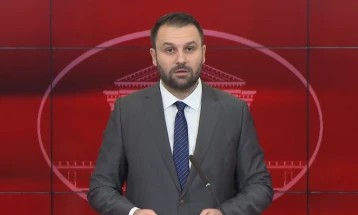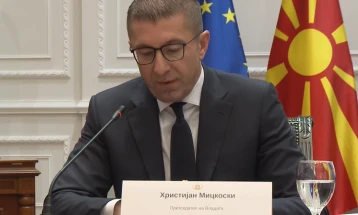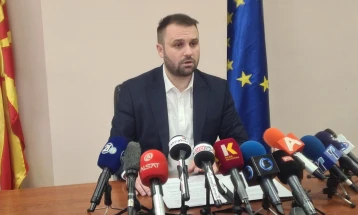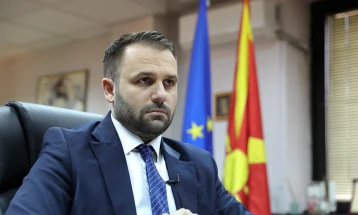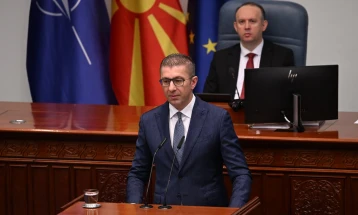Conference on benefits of digitization in customs
- All countries in the world, above all, the developed countries and EU member states, are focusing on customs administration which can streamline and accelerate the flow of goods, said Customs Administration director Slavica Kutirov in her address at conference titled “Through digitization to a new generation of cooperation” held in Skopje on Thursday, also attended by customs administrations manages from the region and international partner organizations.
- Post By Ivan Kolekevski
- 15:33, 9 March, 2023
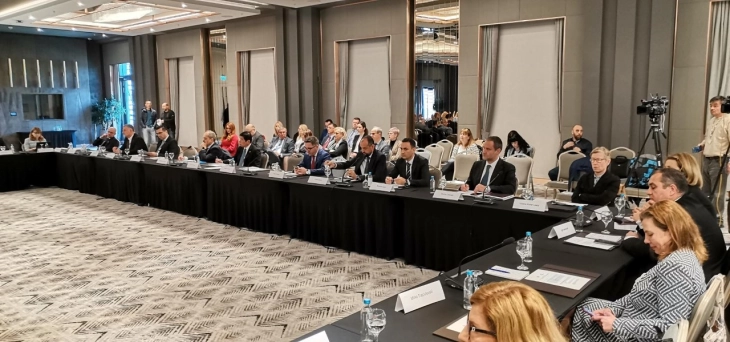
Skopje, 9 March 2023 (MIA) – All countries in the world, above all, the developed countries and EU member states, are focusing on customs administration which can streamline and accelerate the flow of goods, said Customs Administration director Slavica Kutirov in her address at conference titled “Through digitization to a new generation of cooperation” held in Skopje on Thursday, also attended by customs administrations manages from the region and international partner organizations.
“The benefits of digitization and trade facilitation target over 11,000 local companies. The activities are realized in parallel within the Open Balkan Initiative towards further harmonization and streamlining of cross-border procedures in order to enable the free flow of goods and faster EU integration. The true challenge is to create a balance between the increasing acceleration of cross-border trade, which aims to both increase international trade and to implement effective controls to protect the citizens’ health and safety, all the while securing effective payments and protection of the state’s financial interests,” Kutirov pointed out.
World Bank country director Massimiliano Paolucci said that the focus of today's event is border procedure digitization and one-stop-shop in the Western Balkans, as well as considering possible paper-free cross-border trade in the region.
“The Western Balkans is not using the full potential that is possible through close integration with global chains. The reduction of the average border crossing wait times in the region is estimated to be equal to removing 4.6% of the ad valorem tariff, but there are too many non-tariff barriers and limitations holding back increased exports and imports of goods and services,” Paolucci said.
Minister of Finance Fatmir Besimi said that the modern, dynamic way of cross-border movement of people and goods requires constant changes in running services for people and businesses.
“Digitization, the application of modern technological solutions and close regional cooperation in this area are key factors in giving an adequate response to the growing needs and demands of our citizens and companies. It takes a high level of professionalism and transparency in cooperation with all participants in modern trade,” Besimi said.
Deputy PM for Economic Affairs Fatmir Bytyqi said that the consistency, passion and commitment of our border administration will result in the successful and correct implementation of this project, and the full implementation of the first component will simplify the border crossing procedure, minimizing wait times and reducing the number of documents necessary for processing and administration of border services.
The second component will additionally increase efficiency in transport predictability, enabling them to build and install an all-encompassing transport system on Corridor 10, the most frequently used highway in the country.
During the implementation of the third component, the Government is expecting an increase in access to services and regional investments through the implementation of all necessary CEFTA protocols to harmonize all regional initiatives and regulations and avoiding any circumstances in which our companies and citizens wouldn’t be treated equally as the people and companies from the region.
Kunio Mikuriya, Secretary General of the World Customs Organization, said in his address that regional cooperation through digitization is something that the WCO is trying to promote worldwide.
“We emphasize four things often at the World Customs Organization: using international tools and standards, technology, training of customs officers and building trust, and we support our members in this direction,” Mikuriya said.
He believes that regional cooperation is important because digitization of cross-border procedures can contribute to a bigger joint market.
“Customs is very technical and I hope that we can build trust among the six countries of the Western Balkans, and the countries of the EU and the world,” he said.
Mikuriya added that it is key to check suspicious packages, and that data exchange is a key factor in that. Border administrations need to find a way to safely exchange data, and do it often, in order to judge suspicious packages, according to Mikuriya. dk/ik/
Photo: MIA

